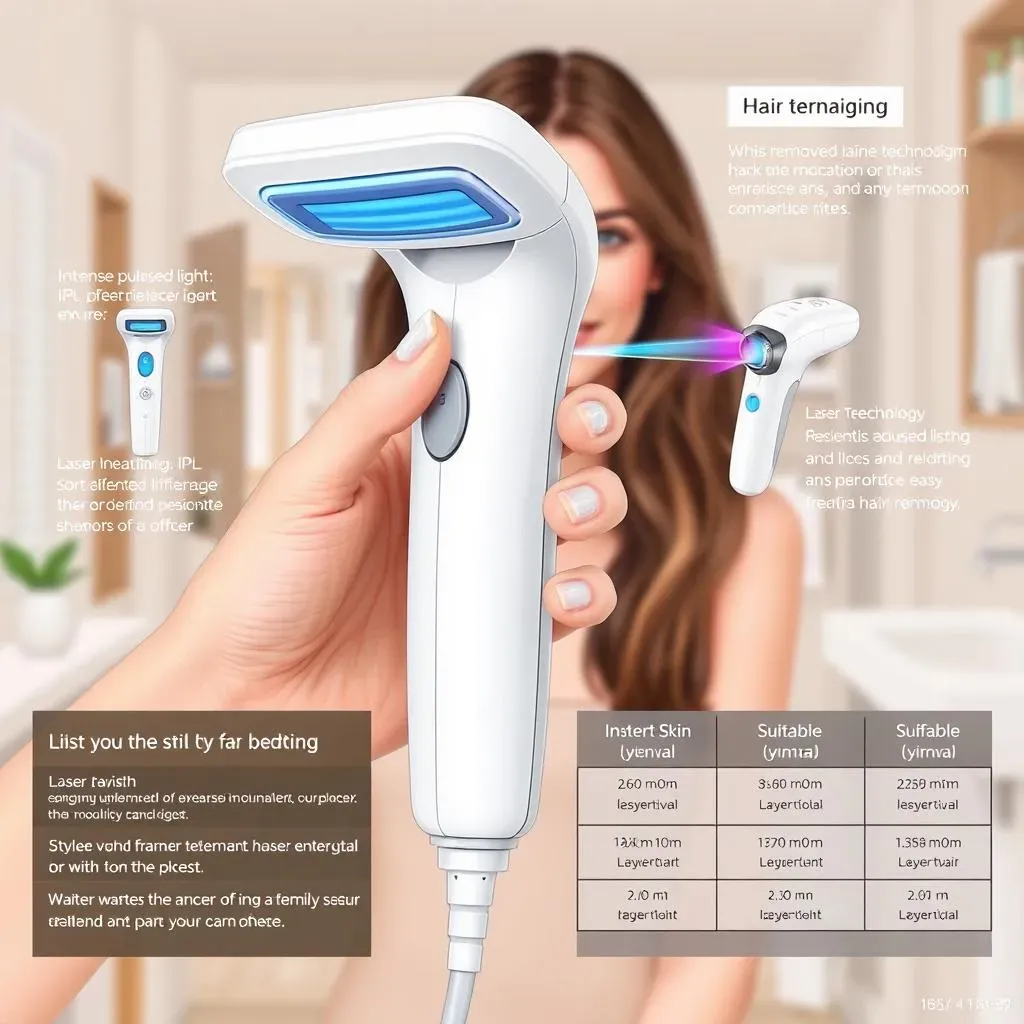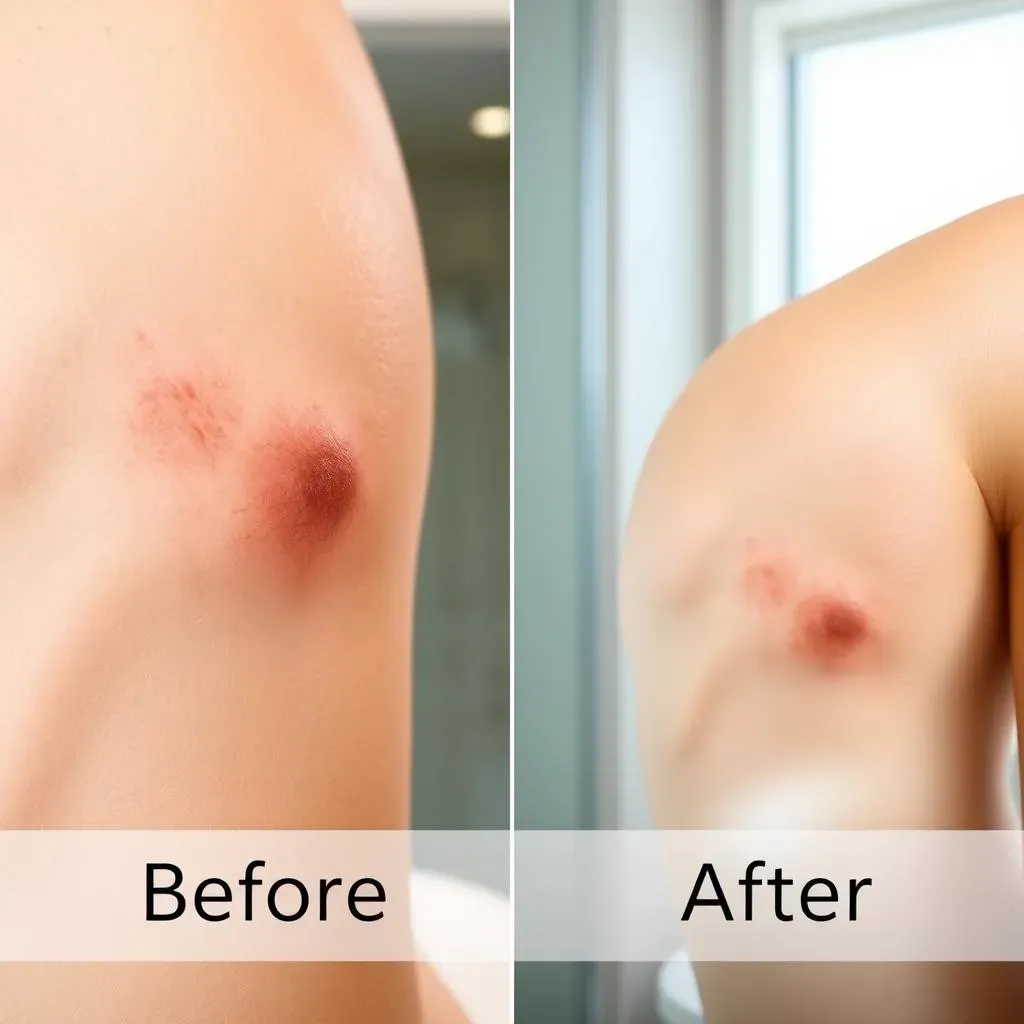Table of Contents
Are you tired of tedious hair removal methods like waxing, shaving, and tweezing? Look no further than laser at home hair removal, a revolutionary technology that allows you to achieve professional-grade results in the comfort of your own home. With the advancement of Intense Pulsed Light (IPL) and laser technology, it's now possible to safely and effectively remove unwanted hair without the need for costly salon visits. In this article, we'll delve into the world of laser at home hair removal, exploring the benefits, risks, and best practices to ensure you get the most out of your device. From understanding how IPL and laser technology work to tips on maximizing results and minimizing risks, we'll cover everything you need to know to start your journey with laser at home hair removal. Whether you're looking to remove hair from your face, body, or sensitive areas, this guide will walk you through the process, helping you to make informed decisions and achieve the smooth, hair-free skin you've always wanted.
Introduction to Laser at Home Hair Removal

Introduction to Laser at Home Hair Removal
Laser hair removal has been a game-changer for those seeking a more permanent solution to unwanted hair. Traditionally, this technology was only available in professional salons and clinics, but with advancements in Intense Pulsed Light (IPL) and laser technology, it's now possible to achieve similar results from the comfort of your own home. Laser at home hair removal devices have become increasingly popular due to their convenience, cost-effectiveness, and ease of use. But before diving into the world of at-home laser hair removal, it's essential to understand the basics of how these devices work and the differences between IPL and true laser technology.
True laser devices emit a single wavelength of light that targets the hair follicle, whereas IPL devices emit a broad-spectrum light that targets the hair. While IPL devices are more common for at-home use, true laser devices tend to be more effective, especially for those with darker skin tones. However, IPL devices are still a popular choice due to their affordability and ease of use. When choosing a laser at home hair removal device, it's crucial to consider your skin type, hair color, and the area you want to treat.
Device Type | Effectiveness | Suitable Skin Types |
|---|---|---|
True Laser | High | Most skin types, including darker skin tones |
IPL | Medium to High | Fair to medium skin tones |
Understanding the differences between IPL and laser technology is vital in selecting the right device for your needs. By choosing the correct device and following the manufacturer's instructions, you can achieve significant reductions in hair growth and enjoy smoother, hair-free skin.
How Laser at Home Hair Removal Works: Understanding IPL and Laser Technology

How Laser at Home Hair Removal Works: Understanding IPL and Laser Technology
Understanding IPL Technology
Intense Pulsed Light (IPL) technology is a type of broad-spectrum light treatment that is commonly used for at-home hair removal. IPL devices emit a wide range of light wavelengths, which are absorbed by the pigment in the hair follicle, causing damage and leading to hair reduction. While IPL devices are not lasers, they are often referred to as "laser" devices due to their similar application. IPL technology is generally considered safer and more versatile than laser technology, as it can treat a wider range of skin and hair types.
However, IPL devices may require more treatments and have variable results compared to true laser devices. It's essential to follow the manufacturer's guidelines and start with lower intensity settings to avoid any adverse effects. When using an IPL device, it's crucial to wear protective eyewear and avoid treating sensitive areas, such as the eyes, eyebrows, and genital area.
Device | Wavelength | Suitable Skin Types |
|---|---|---|
IPL | 500-1200 nm | Fair to medium skin tones |
The Science Behind Laser Technology
True laser devices, on the other hand, emit a single wavelength of light that is specifically designed to target the hair follicle. Laser technology is more precise and effective than IPL, as it uses a focused beam of light to damage the hair follicle. The most common types of lasers used for hair removal are diode lasers, alexandrite lasers, and Nd:YAG lasers. Each type of laser has a specific wavelength and is suited for different skin and hair types.
For example, diode lasers are better suited for lighter skin tones and finer hair, while Nd:YAG lasers are better suited for darker skin tones and thicker hair. It's essential to choose a laser device that is appropriate for your skin and hair type to ensure safe and effective treatment.
- Diode laser: 800-980 nm, suitable for fair skin and fine hair
- Alexandrite laser: 755 nm, suitable for medium skin and medium hair
- Nd:YAG laser: 1064 nm, suitable for dark skin and coarse hair
Key Differences Between IPL and Laser Devices
While both IPL and laser devices can be effective for hair removal, there are some key differences to consider. Laser devices are generally more effective, especially for those with darker skin tones, as they emit a single wavelength of light that is better absorbed by the hair follicle. IPL devices, on the other hand, are more affordable and easier to use, but may require more treatments and have variable results.
When choosing between an IPL and laser device, consider your skin type, hair color, and the area you want to treat. It's also essential to follow the manufacturer's instructions and take necessary precautions to avoid adverse effects, such as burns or skin irritation.
Device | Effectiveness | Cost |
|---|---|---|
Laser | High | Higher |
IPL | Medium to High | Lower |
Best Practices for Using Laser at Home Hair Removal Devices

Best Practices for Using Laser at Home Hair Removal Devices
Preparing Your Skin for Laser Hair Removal
Before using a laser at home hair removal device, it's essential to prepare your skin to ensure safe and effective treatment. Start by removing any makeup, creams, or lotions, as these can interfere with the laser's ability to target the hair follicle. You should also avoid sun exposure for at least 24 hours before treatment, as this can increase the risk of skin irritation.
Shaving the area to be treated is recommended, as this allows the laser to target the hair follicle more effectively. However, avoid waxing, tweezing, or using depilatory creams, as these can cause irritation and reduce the effectiveness of the treatment. It's also important to clean the area thoroughly to remove any dirt, oils, or bacteria that may interfere with the laser.
Pre-Treatment | Recommendation | Reason |
|---|---|---|
Makeup and creams | Avoid | Interferes with laser absorption |
Sun exposure | Avoid for 24 hours | Increases risk of skin irritation |
Shaving | Recommended | Allows for better laser absorption |
Waxing, tweezing, depilatory creams | Avoid | Causes irritation and reduces effectiveness |
Operating the Device and Aftercare
When operating the laser at home hair removal device, it's crucial to follow the manufacturer's instructions carefully. Start with a low intensity setting and gradually increase as needed, ensuring you're comfortable with the sensation. It's also essential to wear protective eyewear to prevent damage to your eyes.
After treatment, avoid direct sun exposure for at least 24 hours and use a broad-spectrum sunscreen with a high SPF. You should also avoid hot showers, saunas, and strenuous exercise for 24 hours, as these can cause skin irritation. Applying a soothing lotion or cream can help calm the skin and reduce any redness or irritation.
- Avoid direct sun exposure for 24 hours
- Use broad-spectrum sunscreen with high SPF
- Avoid hot showers, saunas, and strenuous exercise for 24 hours
- Apply soothing lotion or cream to calm the skin
Maximizing Results and Minimizing Risks with Laser at Home Hair Removal

Maximizing Results and Minimizing Risks with Laser at Home Hair Removal
Understanding the Importance of Skin Toning and Hair Removal
To maximize results with laser at home hair removal, it's essential to understand the importance of skin toning and hair removal. Skin toning refers to the process of preparing your skin for laser treatment by removing any lotions, creams, or makeup that may interfere with the laser's ability to target the hair follicle. Hair removal, on the other hand, involves shaving the area to be treated, allowing the laser to penetrate more effectively.
Shaving the area before treatment can significantly improve the efficacy of the laser. By removing the hair from the surface of the skin, the laser can target the hair follicle more precisely, leading to better results. However, it's crucial to avoid waxing, tweezing, or using depilatory creams, as these methods can cause irritation and reduce the effectiveness of the treatment.
Pre-Treatment Method | Recommendation | Reason |
|---|---|---|
Shaving | Recommended | Allows for better laser absorption |
Waxing | Avoid | Causes irritation and reduces effectiveness |
Tweezing | Avoid | Causes irritation and reduces effectiveness |
Depilatory Creams | Avoid | Causes irritation and reduces effectiveness |
Managing Expectations and Maintaining Realistic Goals
It's essential to have realistic expectations when using laser at home hair removal devices. While these devices can significantly reduce hair growth, they may not completely eliminate it. Results can vary depending on individual skin and hair types, and multiple treatments may be necessary to achieve desired results.
To minimize risks and maximize results, it's crucial to follow the manufacturer's instructions carefully and adjust the device's settings according to your skin type and hair color. Be patient, as it may take several treatments to see noticeable results. Additionally, consider maintaining a consistent skincare routine to help soothe and calm the skin after each treatment.
- Follow manufacturer's instructions
- Adjust device settings according to skin and hair type
- Be patient and allow time for multiple treatments
- Maintain a consistent skincare routine
Conclusion: Maximizing Your Laser at Home Hair Removal Experience
In conclusion, laser at home hair removal is a game-changer for those seeking a convenient and cost-effective solution to unwanted hair. By understanding the differences between IPL and laser technology, following safety precautions, and committing to a consistent treatment schedule, you can achieve significant reductions in hair growth. Remember to choose a device that suits your skin tone and hair type, and don't hesitate to consult with a dermatologist if you have any concerns. With patience and dedication, you can enjoy the freedom and confidence that comes with smooth, hair-free skin. Visit hairawaybylaser.com for more information on laser hair removal and to find the best device for your needs. Embrace the technology, and say goodbye to unwanted hair for good with laser at home hair removal.
